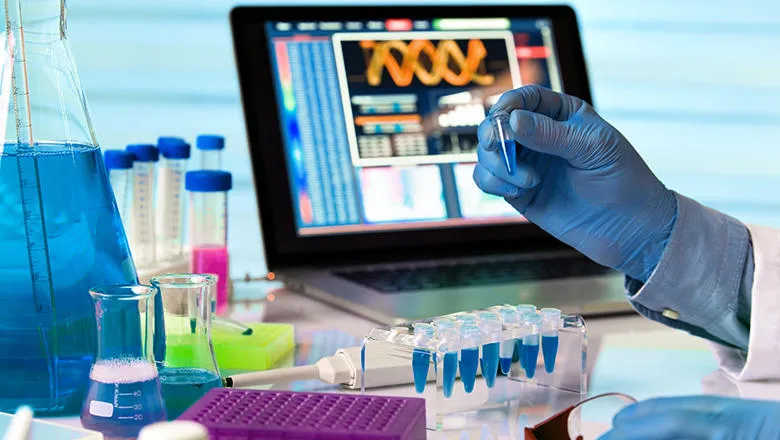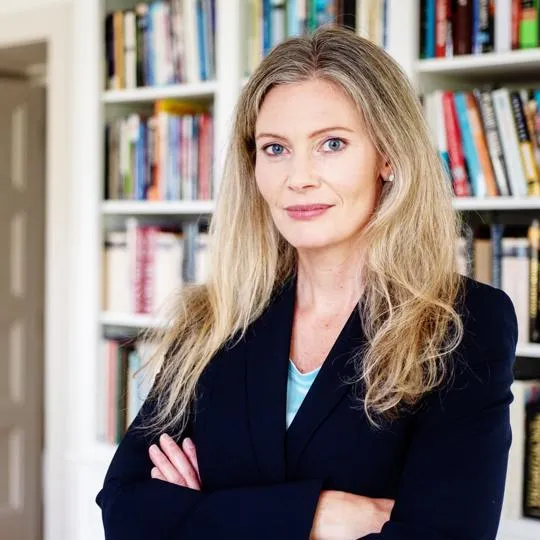The biological risk landscape is becoming more complicated and more challenging. New possibilities to use biology for social control like surveillance, tracking and suppression are opening up, spurred on in part by advances in artificial intelligence, deep learning and computing power. Technical barriers to developing biological weapons are also coming down: it is now possible to cause greater harm than before, technologies are becoming more accessible to more people, attacks can be more precisely targeted based on genetic data, and they can be harder to attribute.”
Dr Filippa Lentzos
17 October 2023
King's expert helps drive safe innovation in engineering biology
A King’s academic with expertise in science and international security is working with the UK government to shape how advancements in engineering biology are governed.

Representing King’s, Dr Filippa Lentzos from the Department of War Studies has been named one of the ‘champions of science’ on the Government’s UK Biosecurity Leadership Council, which aims to make the UK a world leader in responsible use of engineering biology.
This advisory body, which includes experts from the University of Cambridge, and industry leaders, including GSK, Deepmind, AstraZeneca, and Oxford Nanopore, will play a crucial role in ensuring the responsible use of engineering biology within the UK and safeguarding against potential misuse, while fostering innovation in biology, health, and life sciences.
Engineering biology is an interdisciplinary field that is evolving rapidly, offering the capability to construct and redesign biological systems, such as cells and proteins — complex molecules that ensure the function and survival of living organisms.
Advancements in engineering biology have the potential to enhance food production, develop new medical treatments, and address the climate emergency by enabling the production of plastic-free packaging and sustainable fuels for transport. Such advancements have already led to important breakthroughs such as the rapid development of the revolutionary mRNA vaccines for Covid-19 by Pfizer-BioNTech and Moderna, which helped save millions of lives across the world.
Despite the immense promise held by engineering biology in addressing some of society’s greatest challenges, unregulated progress could pose a threat to public safety and the environment. This includes the potential for the development of harmful biological weapons and DNA-based surveillance to target and control populations.
The UK’s engineering biology sector is on the brink of rapid advancement. Cited as one of the five key technologies being pursued by the government, more than £170 million has been invested in strengthening engineering biology capabilities across the country.
The UK Biosecurity Leadership Council will be instrumental in supporting this investment by ensuring the UK becomes a global leader in responsible innovation. The council is an integral component of the UK’s Biological Security Strategy, published in June this year, which aims to bolster the UK’s ability to build resilience to future biological threats.
Ahead of chairing the inaugural meeting of the council in September, George Freeman, Minister of State at the Department for Science, Innovation and Technology, underlined the need for regulation and global leadership in shaping the future of the sector.
He said: “We are already seeing how this new sector can benefit our economy, with the UK founding more biotech companies than anywhere else in Europe. To make sure this position of strength delivers jobs, growth, and a better quality of life for all, now is the time for us to set the pace globally on how this new sector will be governed, empowering responsible innovation in the UK and worldwide.”
In the initial stages, the UK Biosecurity Leadership Council will primarily focus on establishing protocols for the responsible development of DNA-based technology. Recent advancements in this field include AI-assisted technologies for identifying disease-causing DNA variations and AI language-based models that will enable the creation of an expanded range of molecules and proteins.
While these advancements could offer limitless benefits and commercial applications, including accelerated drug discovery, Dr Lentzos cautions that as systems develop alongside cheaper and faster production capabilities, the risk of their misuse increases.
The tools the international community has to address developments in engineering biology are either being actively undermined or are missing entirely. So the council has a lot on its plate, but it is important that the UK is showing leadership on these issues.”
Dr Filippa Lentzos
The council will use their expertise to guide ministers and officials on how AI and new DNA engineering techniques are being used, the potential risks they pose, and how those can be mitigated in a practical and proportional way.
The first meeting of the UK Biosecurity Leadership Council took place on the 14 September 2023. Find out more about the initiative here.

